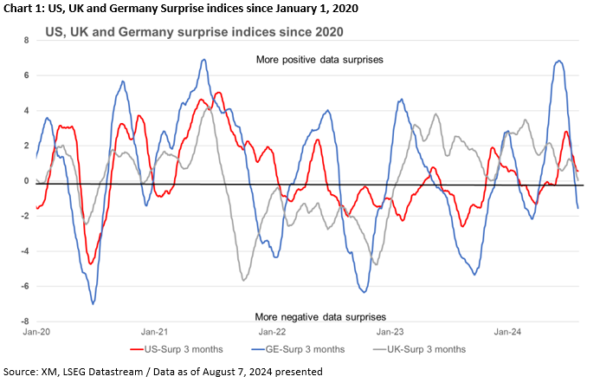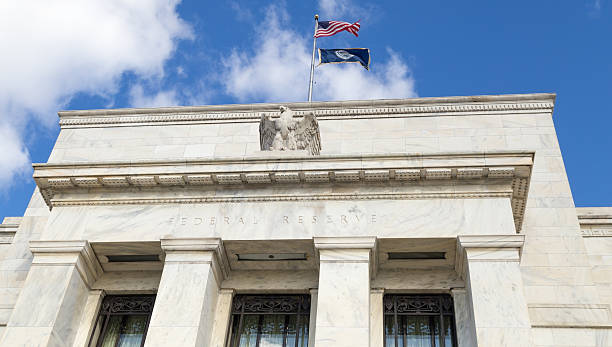- The recent acute market reaction occurred due to increased recession fears
- Surprise indices point to a more balanced US economic situation
- Recessions tend to be caused by one-off major events
The recent market drop has been attributed to higher chances of a US recession
It has been a very volatile period in markets. The recent higher-than-expected rate hike by the BoJ caused a knee-jerk reaction in Japanese stock markets that led to the yen making significant gains across the board. Amidst this fragile environment, the Fed’s choice to avoid a dovish shift did not probably sit well with equity investors who took advantage of the weak US labour market report to stage a strong correction in US stocks.
The increased fear of a US recession has been touted as the key reason for the recent market angst, prompting calls for aggressive rate cuts by the Fed. The market quickly priced in 125bps of total easing in 2024 with this level dropping to around 100bps at the time of writing. The market is currently assigning a 50% probability for a 50bps move at the September Fed gathering.
Is the recent data justifying the market’s fear about recession? Or are equities just experiencing a long-due correction?
A quick look at the US surprise index
In an earlier special report, our custom-made surprise indices were presented. The intention was to (a) identify the current state of economic surprises in each region, (b) compare the different regions, and (c) examine whether these indices confirm or even lead to the performance of key financial assets.
Despite being still in an embryonic state, these surprise indices try to adequately present the current economic sentiment. As seen in Chart 1 below, the US surprise index, created using a 3-month rolling period of economic data releases, peaked in late June and has been dropping since.
This means that over the past three months data releases in the US have been weakening compared to their previous prints, and that data surprises have been more negative than positive. However, the index remains in positive territory, and it is still quite far from the 2020 low, which was caused by the outbreak of the COVID pandemic. Therefore, based on this surprise index the US economy is not exactly falling off a cliff, as Fed Daly very eloquently commented earlier this week.

Recessions tend to be caused by one-off events?
The last two recessions in the US coincided with significant one-off events that almost crashed the global economy. More specifically, the COVID pandemic in 2020 led to an abrupt drop in economic activity that immediately caused an acute risk-off reaction in markets. Similarly, the subprime mortgage crisis that commenced in 2007 led to the so-called “great recession” of 2007-2009, which eventually morphed into the euro area debt crisis.
Moving further back, the dot-com bubble bust that led to the 2001 slowdown could be, on the margin, compared with the current situation. But then again, a one-off event, the tragic September 11 events in the US, exacerbated the weakened economic momentum and forced the Fed to aggressively cut its interest rate with the government also announcing numerous tax breaks.
Another market crash could open the door to aggressive Fed rate cuts
With a US recession still viewed as unlikely, the market might be trying to force the Fed’s hand into aggressively cutting rates. The Fed remains focused in meeting its dual mandate of price stability and full employment, but it is also very attentive to financial stability issues.
Market participants are aware of the Fed’s sensitivity to stock market crashes, the famous “Fed-put”. A market crash could be one of the few reasons that the Fed opts for a 50bps rate cut in September and keeps the door open to further action down the line, if needed.
Interestingly, the last time the Fed aggressively cut interest rates was in March 2020 when in two unscheduled meetings a total of 150bps of easing was announced, 50bps on March 3 and 100bps on March 15.
Putting everything together, the Fed’s choice to avoid a dovish shift at its late July gathering, partly due to the US economy performing adequately, might have contributed to the recent market reaction. By utilizing recession fears and the yen-driven market angst, certain investors might have tried to push the Fed into aggressive rate cuts. With the chances of a 50bps September rate cut dropping to around 50%, barring a major one-off event, certain market participants could be in for a disappointment in September.









